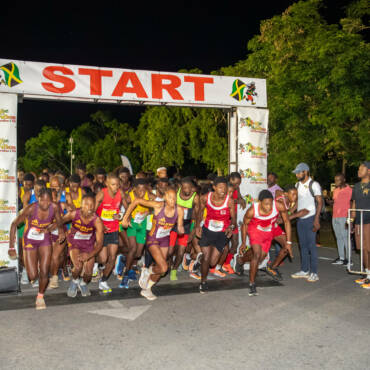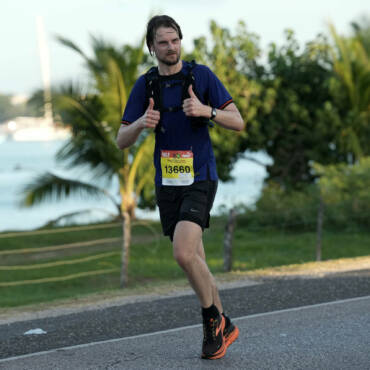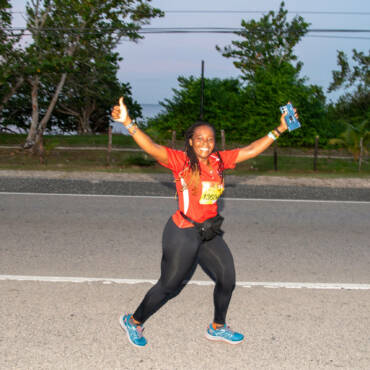We received this excellent ‘Ask Dan’ question recently: “Do you have any advice on how I should pace myself during the Reggae Marathon? “ In this, the first of two parts, Dan shares his personal experience and gives some good advice on marathon pacing applicable for newbies as well as seasoned marathoners.
Ah, the art of pacing your race effort in the marathon, a much considered topic! Yet, one that still produces questions from first time and experienced marathoners. New runners aren’t usually sure what it means and experienced runners, while they know in theory, are still looking for a sure-fire way of actually implementing it in the race situation.
The legendary “negative split” is technically all there is to it. Many will tell you it is the only safe and true road to a Personal Best, too. The negative split is simple. You run the first half of your race slower than the second half. So, there you are my trusting fans. Now, off to Negril for your best marathon ever! (Or, half marathon for that matter.)
Oh, what, you don’t quite follow? You say you have tried this, but always get scared that if you start slow, you won’t go faster, you’ll just go slower. I mean, isn’t that what happens to most of us in our races? It sure is what happens to me. Isn’t it better to “bank” time while you are fresh? Well, generally, NO. Many running pro’s far wiser than me will tell you seconds gained in the first part of a marathon can cost minutes at the end. Just ask me, I have the graphical proof of this from my own marathons.
While it is ever so much harder to do than to say, you really must take the first half painfully easy and TRUST you will have the freshness of leg and stores of energy to bring your race home very nicely.
Pacing doesn’t begin at the Start or as you adjust your gps device pre-race. It starts weeks and months, before, as you train and learn how your body works. Long slow training runs build endurance and help you become familiar with what it takes to be out for that long. The more often you approach the marathon distance, or anticipated race time, the more certain you become of your pacing and your capacity to perform in a race. Someone who really knows how hard they can go, and how long they can go at a slightly easier pace, can turn that into a sustainable race strategy.
It can’t say your first half should be at X/mile and the second half should be X-10 sec/mile. Each runner must work out what is feasible for him or her.
The “problem” at the Start is that you are well trained, full of enthusiasm (adrenalin) and just raring to go (more adrenalin). You are surrounded by other people just as pumped. The gun goes and everybody tears off toward the finish. Great! Amazing feeling! If it is the first time you will be overwhelmed by the enormity of it – perhaps even giddy. You have trained and worked and sweated and here you are. This is it. YOU are running a MARATHON! Actually, it would probably be best to just stop right there and wait until your emotions settle down. Of course you won’t, and I’m not really saying you should. Enjoy the feeling by all means, but don’t let it get the best of you. Really watch your pace over the first few miles. The course is marked in miles with aid stations at every mile. You should know before you start, what your target pace is to be. I have run as a clinic pace leader many times and one of the hardest things to do is to set a steady pace and hold it. Use the course markings and your watch, or your gps device. You will be glad you did.
I highly recommend that you look at a realistic finishing time, maybe even a range of times reflecting a not so good day, a normal day and a totally awesome day. From that it is easy to calculate your target pace(s). Start out running your moderate, realistic and planned race pace. If the weather is awful, the course harder than you anticipated, or the hot curry you decided to try for the first time, ‘cause it smelled so good has turned out NOT to be the ideal pre-race meal, back off to your “not so good” pace. On the other hand if the sky is blue, your hydration perfect, the Reggae Marathon Pasta Party set you up with energy to spare and you can practically taste the post-race coconut water (and Red Stripe), then pick it up some – not too much. If you haven’t run a marathon before, but have done other distances, there are calculators that will help you figure out what a realistic marathon goal will be. One of my favourites is McMillan Running Calculator
In Part II, Dan shares some specific tips on marathon pacing.
Until next time…
Reggae Marathon RunninGuy
Note: Reggae Marathon’s “Ask Dan” is a seasoned runner who writes a blog “Running In the Zone” and answers your questions about running. Send your questions to [email protected]. Photo courtesy of Errol Anderson Photography.



